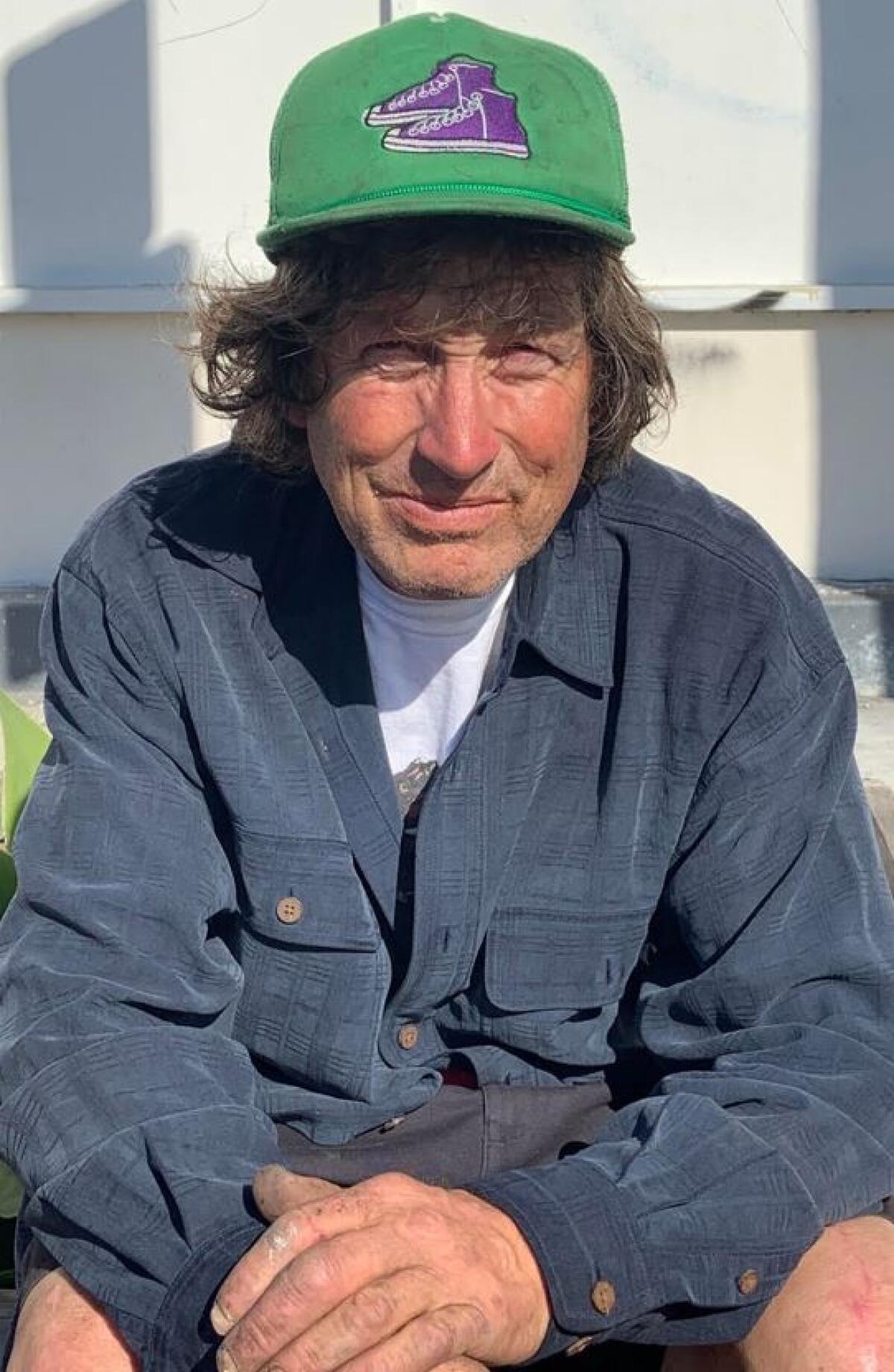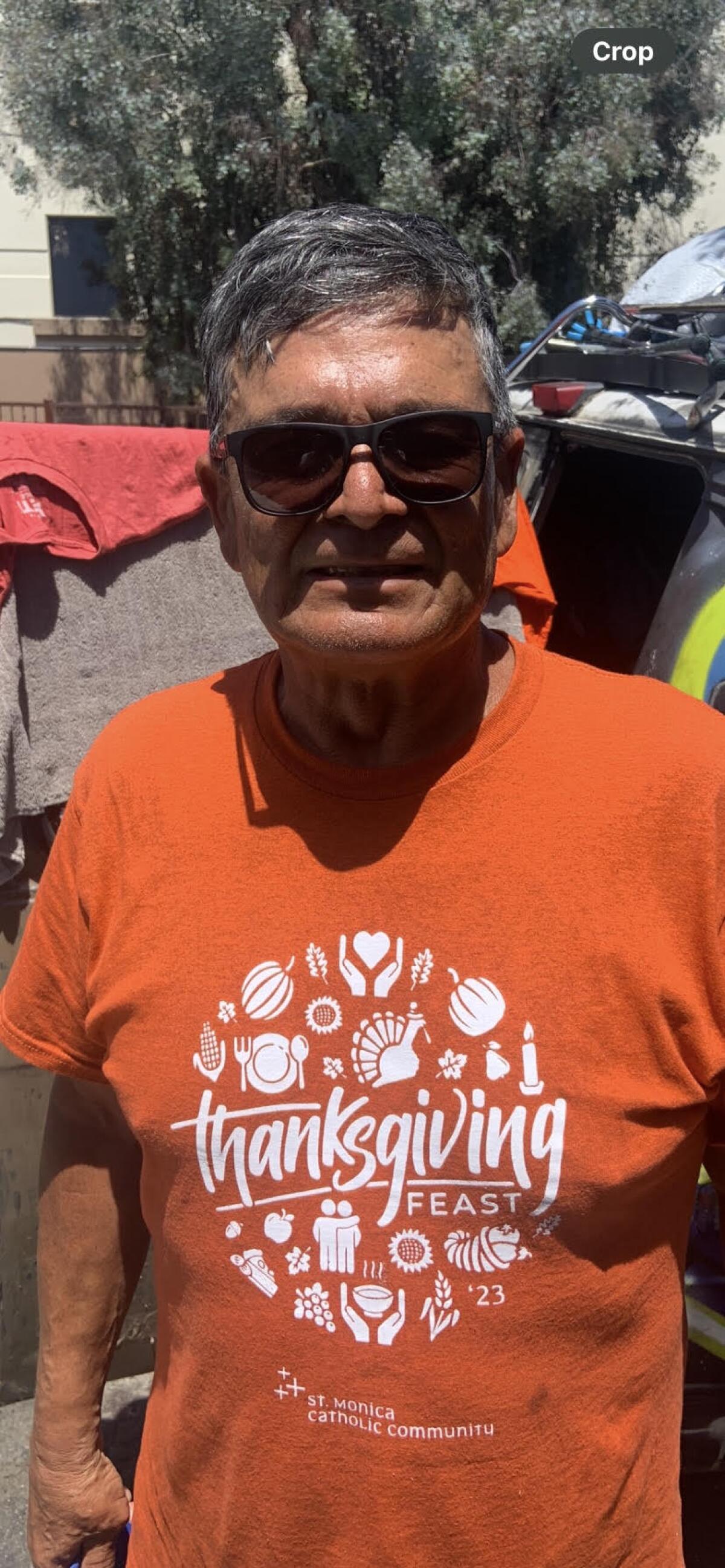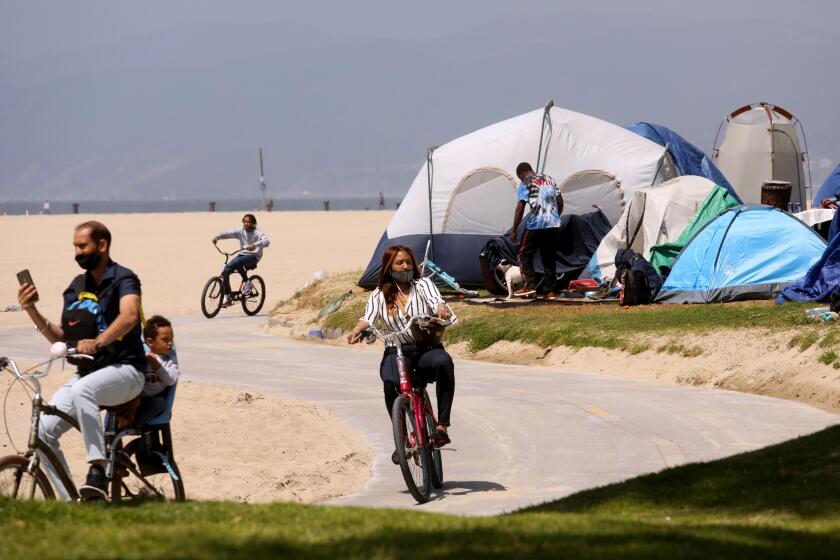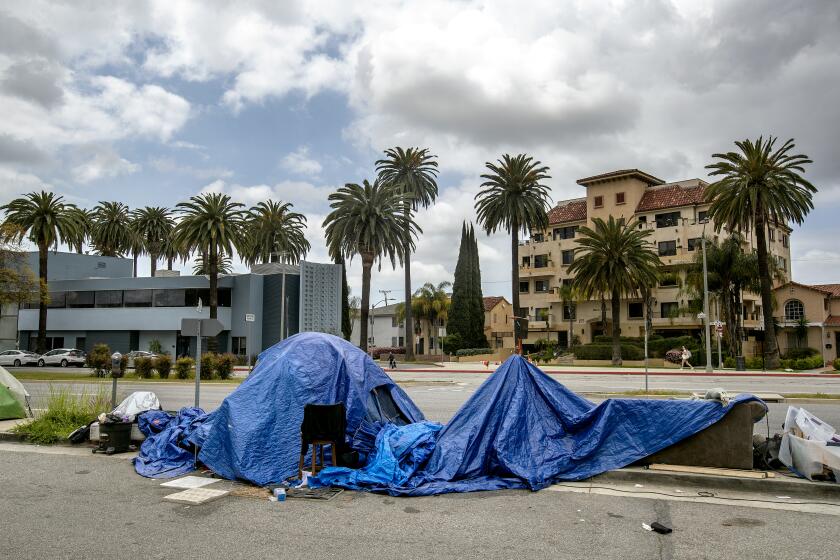Opinion: Some in a blue-collar job are just one injury away from homelessness

- Share via
Most Americans make a living without taking a huge toll on our bodies, but millions of blue-collar workers depend on their bodies to earn an income. Eventually, these workers will confront a harsh reality: As you age, your body will limit the amount of work you can do. In May, I spoke with two unhoused older men who live in Venice. Their bodies served them well — until they didn’t. Both were gifted athletes and aspired to play professional baseball, and both later found work in construction, which paid well — until it didn’t. In Los Angeles County, where rents average more than $2,000 a month, anyone in a blue-collar job is uniquely vulnerable to homelessness. If we want to keep people off the street, we need a stable support system for those who can no longer do the grueling work that once supported them. Kenny and Daniel agreed to share their stories with The Times on the condition that their last names not be used. — Robert Karron
Kenny
My name is Kenny, and I’m 59. I was born and raised in Santa Monica. I went to Grant Elementary, John Adams Middle School and Santa Monica High. I’m a slow learner, and by high school my grades were dropping — A’s turned to Cs. Teachers don’t have time for people who don’t understand quickly. Also, I liked sports — anything with a ball — and I was on every team they had. That made it harder to study. Practice — that’s two hours of your day, easy.

I was a good baseball pitcher. In Little League, a famous pitcher and coach, Burt Hooton, saw me play and told my dad that I had an “exciting arm” with my curveball but that he could teach me a knuckleball, which wouldn’t hurt my arm as much. You can’t hit those. You don’t know where it’s going. It’s like a face coming at you. He taught me, and I got good. Even today, people call me “Knuckles.” We came in second place that year.
I often hear from my unhoused neighbors that their needs are not complex. Even a modest monthly check would be transformative for many.
I left Samohi and enrolled at Olympic, the alternative high school. After that, I played baseball for the American Legion — but I wasn’t big enough. I’m only 5 feet 8. My arm’s not long enough to throw a fastball in the 90s or 100 — where you need it. My fastball, on a good day, is 80. So I peaked early. Everyone grew around me, and they all got better. I moved out of that league and played for another for two years as a switch-hitter before I started hanging out with my friends at Lake Havasu. I’d made these rich friends in Santa Monica. They’d invite me out on their $125,000 boats.
I got into construction. I was a journeyman carpenter for 10 years. I got my training at Cal State Northridge, after the earthquake — started as an apprentice, but after two years, I was on top. We had to rebuild that whole place. Tore the library down and built it back up, from scratch. I felt bad for that school. The math did me in, though — all that drafting. It was like high school all over again. I thought, “If you’re not going to help me, I’ll just leave.”
I got my training at Cal State Northridge, after the earthquake — started as an apprentice, but after two years, I was on top. We had to rebuild that whole place.
— Kenny
I came back to Santa Monica and started surfing and skateboarding professionally, hanging out with Jay Adams and Jeff Ho and Tony Alva. (I just saw Tony a few months ago, on the Boardwalk.) Look at my Dogtown tattoo — “POP,” for Pacific Ocean Park, our spot. I also worked at a few golf clubs. I think I always concentrated on sports because I felt I couldn’t hang with the smart kids, who were getting Bs — the intellectuals. There was this big divide.
I kept working as a carpenter. Those rich friends always had building projects they needed help with. One kid’s dad owned an apartment complex, and I’d work on that. I still do construction jobs, if someone asks. I’d rather work than not. But it doesn’t pay much, and for the last 20 years, I’ve been in and out of apartments or staying with friends. For the last 10 years, I’ve been in this car. I did own a place with a girlfriend in Valencia once, but when she started being pushy, I told her she’d be better off without me. I took my El Camino, my skateboard, my wet suit and my trophies, and I said to her, “Have a good day.”
Things took a turn in 1999, when I lost my driver’s license. I had a great job, maybe my favorite of them all. My friend’s father got it for me: cargo agent for Gateway Freight Services at LAX. I’d go into the planes before anyone else did. I had all those patches on my arm. We’d move 1,500-pound pallets; I worked with these Samoan guys who’d just bump them onto the truck, but I’d need a forklift. I did that for four years. But when I lost my license, I lost that job.
My dad owned a gas station at Lincoln Boulevard and Rose Avenue in Venice — across the street from where the Whole Foods is now (yes, next to La Cabaña). When he died, my siblings sold his house, and I got $100,000. I rented a place with that, sure. I lived there for a few years. But then the money was gone.
Daniel
My name is Daniel, and I’m 64. I was born in Oxnard, and I had an excellent childhood. Mom was a social worker and Dad was a contractor. I was valedictorian of my senior class. I went to Cal State Northridge on a baseball scholarship — played shortstop. Loved my classes. Paula Abdul was in one. I was sharp in math, but I wanted to play pro baseball and concentrated on that so much I didn’t finish. I still have four or five classes to go.

After college I worked for an electrical company. I’d made contacts with all these contractors because they sponsored the summer leagues. When work was slow, I took jobs with Ferro’s, a framing contractor. That was steady work for seven years. But I got tired of the Valley and moved back to Ventura, where I was a mortgage lender — construction loans, refinancing. Because of my math skills, I was good at it but I didn’t care for it. There’s no base salary. Everything’s commission. Some months I’d make $8,000, some months nothing. After five years, I quit and started working for my father in the cement finishers union — Local 741, in Ventura. I had cousins there, my brothers, lots of friends. I did 10 years with him. We poured patios, house foundations. Because it was union, we made $42 an hour — and this was in 1991. Some semesters I’d go to night school, trying to make up for those missing classes, but I still haven’t finished. I was busy. My son was born in ’93.
Then the unions went under. We had to go nonunion. No benefits, no insurance. We’d go to union headquarters, but they had no work. Meanwhile, outside, these contractors are saying, “We need help, and we pay $250 a day, cash.” I had a baby at home. I said, “I’m outta here.” I was the first to jump. Everyone was angry at first, but then the next week they’re working next to me.
Jermaine, Jason and John all landed on the streets when they were squeezed between high housing costs and low incomes. What could have kept them in their homes?
Construction is bad for your knees. It started with baseball, but since then, I’ve had five knee surgeries. This one was replaced in 2012. After a while, I couldn’t work without pain. I was hobbling. I got my inspector’s license. Did home inspections for six years, but it doesn’t pay well, so I started contracting on the side, actually working for another contractor who had the license. I did kitchens, room additions; I hired my brothers. But by 2001, construction had dried up. Then I broke up with my son’s mother.
The first year of her illness, insurance covered most of it. Then they started regressing on the payments. (It’s in the fine print.) By the time she passed, I had nothing.
— Daniel
My sister lives in San Luis Obispo, and she owned a body shop with her husband. I worked there two years. The money wasn’t good, but it was enough to pay $400 in child support. Sometimes I’d go to a famous restaurant called Jocko’s — it’s been there forever. I met Kim there. We were together 10 years, before she passed, of breast cancer, on Aug. 29, 2010. She was my best partner in the world. On her deathbed, she asked if I’d marry her so she could die being my wife, so I did.
The first year of her illness, insurance covered most of it. Then they started regressing on the payments. (It’s in the fine print.) By the time she passed, I had nothing. Sold my car, sold all kinds of stuff. Came back to Ventura, and I met Cindy. We hit it off. I moved in with her; we were together six years. She wanted to get married, but I didn’t want to get married anymore. That was four years ago.
I moved in with some cousins and paid them rent. I moved in with another friend and paid him. I was bouncing around. Went to Vegas for a month, Laughlin for six. Last December, I drove to see my friend Andy in Venice. We do it every Christmas — spend the week together, playing golf. The second night, we went to a movie, and the escalators weren’t working. We walk up and near the top, there were ice cubes on a step. Both feet come out from under me. Those escalators are stainless steel and sharp. Broke my left hand, wrist, separated my shoulder, cut my right knee up. The theater said they’d take care of it and they have insurance, but I eventually had to get a lawyer. I’ve been going to therapy three times a week for 15 months, but my fingers are still numb.
So now I’m stuck here, because my doctor, my physical therapist and my attorneys are all here. I lived on Andy’s couch for a while, but eventually I said no. I went to my car. After six months, I took it in for service, and they tried to charge me more than it’s worth. I told them to keep it. For four months, I was in a tent. That was bad. I got this van last week, for $500. I’m trying to get into a shelter — I mean, I’m disabled, I’m a senior and I’m low-income. … But I haven’t found anything yet, and I’m not sure how much longer it will be until my lawyer works out a deal with the theater’s insurance company.
Robert Karron teaches English at Santa Monica College. @robertkarron
More to Read
A cure for the common opinion
Get thought-provoking perspectives with our weekly newsletter.
You may occasionally receive promotional content from the Los Angeles Times.












